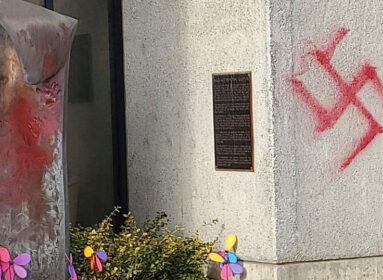
By Cindy Mindell
Yair Rosenberg is a senior writer at Tablet Magazine and an editor for the Israel State Archives. Writing about the intersection of religion, politics, and culture, Rosenberg has covered everything from misrepresentations of Orthodox Jews in the media to political anti-Mormonism and has written for The Wall Street Journal, The Atlantic, The Guardian, and the Jewish Review of Books.
The 2012 magna cum laude Harvard graduate in history and Jewish Studies also holds the dubious honor of being among the 10 American journalists to receive the highest number of antisemitic tweets between August 2015 and July 2016.
The statistic was revealed in Anti-Semitic Targeting of Journalists during the 2016 Presidential Campaign, a report by the Anti-Defamation League (ADL) Task Force on Harassment and Journalism released in October 2016. Formed in June 2016 in response to a disturbing upswing in online antisemitic abuse of reporters, the task force advisors include working journalists, deans from two of the top journalism schools in the country, and experts on hate speech.
The study shows that a small cohort of journalists bore the brunt of the online abuse. The task force identified some 19,253 overtly antisemitic tweets sent to at least 800 journalists in the U.S. during the 12-month study. The top 10 most targeted journalists – all of whom are Jewish – received 83 percent of those 19,253 tweets. In addition to Rosenberg, the top 10 include conservative columnist Ben Shapiro, Atlantic’s Jeffrey Goldberg and The New York Times’ Jonathan Weisman, and CNN’s Sally Kohn and Jake Tapper.
Rosenberg will join ADL Connecticut Regional Director Steve Ginsburg for a conversation about “Hate Online and How to Respond” on Monday, Feb. 6 in West Hartford.
He spoke with the Ledger about life at the other end of online abuse.
Q: How did the targeting of Jewish journalists during the recent presidential campaign begin?
A: I cover religion, politics, and culture for Tablet Magazine. Included in the politics part is national politics and American politics: I’ve covered the last two presidential elections; I’ve been at the Republican and Democratic national conventions, and I have followed the campaigns and election very closely.
This election, I was following the Trump campaign early on, long before he was the nominee, when there were many competing primary candidates among the Republicans. I would write pieces that were critical of Trump and, typically, the people criticizing Trump early on were not journalists – because he wasn’t yet taken seriously – but were largely conservative political people who didn’t want Trump to be their party’s nominee. If you were Jewish, you would get a tremendous amount of online abuse from a subset of Trump’s base, people whom we now know as the “alt-right.” These people have been around for a very long time; whatever they’ve been calling themselves, I’ve been seeing them for quite some time on social media and other places long before Trump was on the scene. But they coalesced around his candidacy as something that they felt would advance whatever they think of as their vision for America.
I started getting this stuff early on in the primary campaign, as did many other conservative Jewish activists, and it got worse as he moved closer to the nomination and then when he got the nomination. At that point people in the mainstream started to notice what was happening, because mainstream journalists themselves were writing about the campaign and, in some cases, criticizing the campaign. If they were Jewish, they were getting a lot of this alt-right, antisemitic abuse online. That could take the form of ethnic or religious slurs, or PhotoShopped images of the person’s face in a gas chamber or concentration camp.
Q: Did the online abuse cause you to be concerned for your personal safety?
A: This sort of stuff is designed to intimidate and make journalists uncomfortable and perhaps more reticent to write about the Trump campaign. For the most part, it has no real-world connection, which is not to say that these people don’t exist in real life and that they’re not worrisome and that it’s not more worrisome now that Trump has won.
But what’s happening online was happening, for the most part, exclusively online, as an organized attempt to drive Jewish journalists into a corner or out of social media and trying to make them less willing to engage on this subject. Once you realize that’s the case, and you realize that it has no teeth and it’s a bunch of people who are writing abuse at you anonymously, you can decide just not to let it get to you.
There were some journalists who got it far more so, like Julia Ioffe, who was one of the first mainstream journalists people went after. When she wrote a critical profile of Melania Trump for GQ she got a tremendous amount of abuse – messages on her phone and other things. She just kept going because she doesn’t back down.
In the end, these people aren’t willing to say things under their own names because they know that as soon as they come out and start talking about this openly and attributing their own names to it, they could suffer real repercussions in their own communities. And as soon as that social stigma is in place, it’s not so worrisome. But there are worries, of course, that over four years of a Trump administration, these people could feel more and more empowered and feed more into the mainstream. So we’ll have to see, and people will have to be vigilant about that.
Q: As a journalist, how did it feel for you to be the story, as opposed to simply writing about it?
A: As someone who’s reported on antisemitism for many years in America and Europe, it was interesting to be suddenly at the center of an antisemitism story, rather than a stray email or tweet here or there. But a lot of people who deal with antisemitism in many places deal with something far worse than anything that I experienced, and we have to prioritize what is more and less problematic in terms of antisemitic expression, because there’s lots of stuff going on. In Europe, for example, it’s far more disturbing because it’s done under people’s own names and often explodes into violence. Thankfully, in America, we don’t have that right now. We have to be vigilant that we don’t become that way, but that’s different from worrying that we’re there already.
Q: Do you think ADL has been effective in terms of monitoring attacks against Jewish journalists? Are other organizations also helping in this role?
A: In the giant constellation of Jewish organizations, the ADL’s job is largely just this – fighting extremism and bigotry – so it makes sense that the ADL has taken this on. I think that they’ve been doing a very good job from the beginning, and they’ve been on the ball in terms of recognizing what’s going on. This is very important: they are willing to confront this sort of bigotry when it comes from the Left or the Right, from any political group or party, and they’re not playing a partisan game.
Unfortunately, there are lots of organizations out there who are very able to identify bigotry when it comes from people that they have other reasons to disagree with, but when it comes from people in their own community, they’re unwilling to do that. The ADL exists to challenge all of those communities and it has done that. It got a certain amount of attention during the election because it pointed out that the antisemitic stuff was coming out of Donald Trump’s base, but they’ve also been quite strong in confronting antisemitism on college campuses that usually come from more leftist places. I think they’re doing what needs to be done.
Q: What can Jews do both as individuals and as organizations to combat this unfortunate phenomenon?
A: In general, if you care about this issue, it’s important that you speak out about it – and that you do so in a non-hectoring, not too depressing way, with friends and colleagues, especially non-Jews. Jews know about this stuff but very often, well-meaning non-Jews, especially if they live in coastal liberal enclaves where they don’t see this kind of thing, think it doesn’t exist and that it’s not a real thing. In point of fact, it’s actually a very real thing and, in many ways, it is intensifying right now.
I think it’s an important subject for me to cover because I have an audience of people who are not just Jewish and who are all over the political map. They take me seriously, thankfully, and when I write about this phenomenon it educates them. People can share it on social media, they can discuss it with people who they suspect don’t know as much about it. Talking to the converted is nice, but it doesn’t actually raise awareness.
Jewish groups can partner on events with other minority groups to create conversations about the bigotry they both face. These are productive conversations to have because different groups come up with different strategies to identify and fight bigotry, and they can learn from each other and discuss how they can come together to help each other. The ADL does this: they partner with the NAACP and many other organizations that fight bigotry against other groups. They’re doing this on an organizational level and there’s no reason that communities, synagogues, and local Jewish groups can’t do the same thing with their equivalents on the grassroots level. If you want to educate people about antisemitism and also improve your own moral education and learn about other forms of bigotry and how you can help fight them, that’s a great way to do it.
Q: How will you navigate Trump’s apparent hostility toward journalists?
A: There are two kinds of journalists; my kind is going to have it a bit easier and we don’t have to change much.
A lot of journalists are access-based journalists, which means that their job is to cultivate sources in important places – in the government and other institutions – and then use those sources, whether anonymous or public, to create and build stories and tell us things that we wouldn’t otherwise know. If the Trump administration successfully freezes out a lot of the media and nobody talks to the media and there’s constant contradiction from what does come out, it’s going to be quite difficult for those journalists to report using their usual model.
Then there are journalists like me, who may talk to people, but that’s not usually the cornerstone of what we do. I write more analytical pieces. I get in touch with people when I have particular questions to ask about particular issues I’m writing about, but I don’t sit around reporting every little thing that gets said by the executive branch; I pick the things that interest me and I delve deeply into them.
I also write from an opinionated standpoint, more like a traditional New Republic or Mother Jones position on the Left or a National Review perspective on the Right. The people who write for these publications are very serious journalists but they also have opinions. I too have opinions that I am very open about and I try to justify those opinions to my readers, while reporting very accurately along the way. In general, that sort of journalist is going to be liked and disliked by different groups of people, depending on whether or not they like what the journalist has to say. I am always going to have that issue: sometimes people will want to talk to me and sometimes they won’t.
Whereas reporters who are just straight news reporters are in a more difficult position when the administration no longer wants to talk to them. They can’t call the big sources and they can’t distinguish who has authority and what the administration actually believes. Those reporters are going to have a tricky time reinventing what they do. I would like to think that it will make them better at what they do because adversity will cause a certain amount of reinvention. I don’t think that that’s a problem but obviously, it’s going to be a big challenge for those who do that sort of journalism going forward.
Q: How would you explain American media coverage of terror attacks throughout the world? For example, recent truck-ramming attacks in Berlin and Nice were widely reported on by American media, but the Jerusalem attack that killed four IDF soldiers has been largely ignored.
A: It’s a general issue, which is that Israeli attacks are not counted as terror attacks sometimes, but if you bring it up, American media outlets will often correct their reports. A major news network will do a timeline of terrorist attacks over the last year and terror attacks in Israel will not be included. It’s actually extraordinary. Then people will complain and the attacks will be added.
Terror attacks in Israel are not understood in the same way; people will find ways to dismiss murderous terrorist attacks against Jews because they take place in the context of an ethnic conflict that, subconsciously I think, some people decide is therefore somehow more justified. They wouldn’t say that out loud but they’re thinking it. They’re saying, “I don’t necessarily agree with this tactic but it’s a totally different context and therefore it’s not a terrorist attack” in the same way as a terrorist attack in Germany – where the person also has political grievances and also considers himself to be involved in a political conflict. But I think that view is harder and harder to sustain and at a certain point you’re going to see less of it.
The car-ramming incidents in Germany and France were so spectacular and got so much more coverage. The Israeli incidents happen so frequently in Israel – all different kinds of attacks such as stabbings and car-rammings – and they’re on a smaller scale, so it all blurs together and it doesn’t come to mind for a journalist. The downside of having so many little terrorist attacks instead of one big, spectacular one is that people generally don’t remember the specifics of any of them and then they won’t remember them as a particular type.
“A Conversation about Hate Online and How to Respond” with Yair Rosenberg and Steve Ginsburg, ADL Connecticut regional director: Monday, Feb. 6, 7 p.m. at Beth El Temple, 2626 Albany Ave. Admission: $10. For more information: (203) 780-0209, tsidera@adl.org.








 Southern New England Jewish Ledger
Southern New England Jewish Ledger








